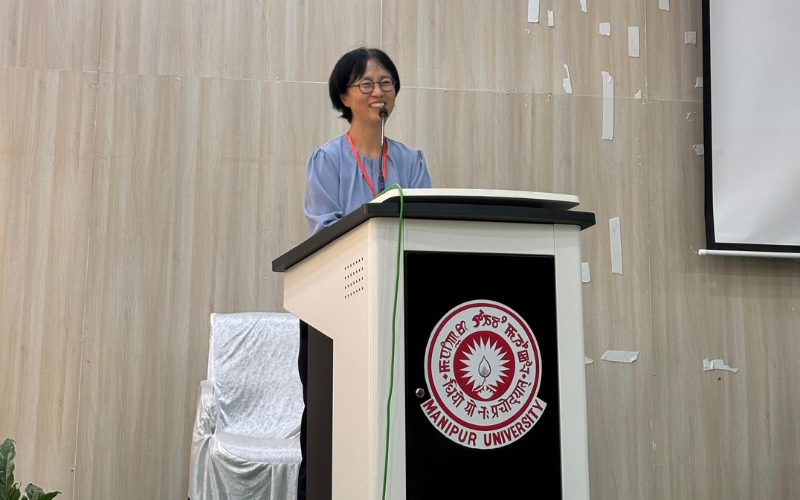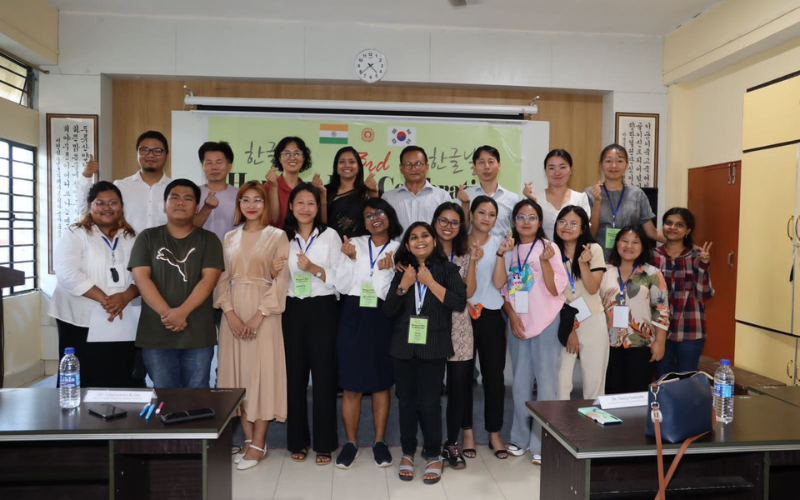- 한국어
- English
- 日本語
- 中文
- العربية
- Español
- Français
- Deutsch
- Pусский
- Tiếng Việt
- Indonesian
By Honorary Reporter Shrabanti Chowdhury from India
Photos = Manipur University
Lee Hyun-kyung, a visiting professor at Manipur University in Imphal, India, seeks to play a role in cultural exchange between Korea and India by teaching Korean language and literature at the school.
As a teacher of Korean as a foreign language and comparative linguistics, Lee combines her academic specialty with her experience of working with Manipur students.
The following are excerpts from a Dec. 15 Zoom interview with the professor.

Lee Hyun-kyung delivers a lecture at the fifth Korean Educators Workshop on Korean Studies at Manipur University in Imphal, India.
Briefly introduce yourself and your academic journey.
I'm a visiting professor at Manipur University and have taught Korean since 2008 under the sponsorship of the Korea Foundation. I've worked at various institutions as a guest lecturer and visiting professor including in Korea.
My journey to India began when I met an assistant professor at Manipur during a visit to the University of Delhi. She invited me to give guest lectures, leading to discussions with the Korean Embassy in Delhi, which ultimately brought me to Manipur with my family. I find Manipur the ideal location both personally and professionally.
Why did you choose Manipur and how has its community culture influenced you?
Manipur is an incredibly beautiful place with passion, and the enthusiasm here for Korean culture including K-dramas, K-pop and Korean cuisine played a key role in my decision to settle here. Student passion has greatly shaped my teaching methods, prompting adapation of my approach to fit their cultural context. I integrate local elements into my curriculum by focusing on practical exercises and comparative linguistic studies.
What are the challenges of teaching Korean in multicultural India?
Teaching in a multicultural and multilingual environment like India presents a unique set of challenges, especially in pronunciation and grammar. Students come from diverse linguistic backgrounds, and the differences in pronunciation can make it difficult to teach them accurate Korean phonetics. Those from Hindi-speaking regions often have a high-pitched intonation, which doesn't align with Korean pronunciation.
To overcome this issue, I use practical exercises and comparative studies between languages in Indian and Korean to help students bridge the gap. One memorable experience was seeing how quickly students adapted when using interactive learning tools like language software.
How do you see the future of Korean studies over the next five years?
The future of Korean studies in India looks very promising. With growing interest in learning Korean, more universities are offering related courses. Over the next five years, I expect these programs to expand with more scholarships and academic exchanges between the two countries. Educational policy is evolving to accommodate this trend, which will likely result in more structured and formalized programs that offer more professional opportunities to students.

This Hangeul Day (Oct. 9 in Korea) celebration featured Korean food, a cultural festival, K-pop and Korean speech contests, Korea-India quiz and workshop on Korean-language education.
What advice do you have for those looking to pursue a career similar to yours?
My advice is to stay curious and open to new experiences. Linguistics isn't just about language, but about understanding culture, history and identity. I recommend interdisciplinary studies like translation, interpretation or Korean literature, as they complement each other.
Seizing opportunities in exchanges and certifications can further career growth. Above all, remember that teaching and learning languages is about building bridges between people and cultures.
msjeon22@korea.kr
*This article is written by a Korea.net Honorary Reporter. Our group of Honorary Reporters are from all around the world, and they share with Korea.net their love and passion for all things Korean.